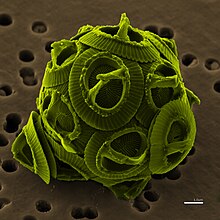
Geomicrobiology is the scientific field at the intersection of geology and microbiology and is a major subfield of geobiology. It concerns the role of microbes on geological and geochemical processes and effects of minerals and metals to microbial growth, activity and survival.[2] Such interactions occur in the geosphere (rocks, minerals, soils, and sediments), the atmosphere and the hydrosphere.[3] Geomicrobiology studies microorganisms that are driving the Earth's biogeochemical cycles, mediating mineral precipitation and dissolution, and sorbing and concentrating metals.[4] The applications include for example bioremediation,[5] mining, climate change mitigation[6] and public drinking water supplies.[7]
- ^ Smith, H. E. K.; Tyrrell, T.; Charalampopoulou, A.; Dumousseaud, C.; Legge, O. J.; Birchenough, S.; Pettit, L. R.; Garley, R.; Hartman, S. E.; Hartman, M. C.; Sagoo, N.; Daniels, C. J.; Achterberg, E. P.; Hydes, D. J. (21 May 2012). "Predominance of heavily calcified coccolithophores at low CaCO3 saturation during winter in the Bay of Biscay". Proceedings of the National Academy of Sciences. 109 (23): 8845–8849. Bibcode:2012PNAS..109.8845S. doi:10.1073/pnas.1117508109. PMC 3384182. PMID 22615387.
- ^ Cite error: The named reference
:0was invoked but never defined (see the help page). - ^ U.S. Geological Survey (2007). "Facing tomorrow's challenges - U.S. Geological Survey science in the decade 2007-2017". U.S. Geological Survey Circular. 1309: 58.
- ^ Cite error: The named reference
Konhauser2007was invoked but never defined (see the help page). - ^ Cite error: The named reference
:1was invoked but never defined (see the help page). - ^ "Mitigation of Climate Change in Agriculture (MICCA) Programme | Food and Agriculture Organization of the United Nations". www.fao.org. Retrieved 2019-10-02.
- ^ Canfield, D.E.; Kristensen, E.; Thamdrup, B. (2005). Aquatic geomicrobiology. Vol. 48 (Transferred to digital print ed.). London: Elsevier Acad. Press. pp. 1–599. doi:10.1016/S0065-2881(05)48017-7. ISBN 978-0121583408. PMID 15797449.
{{cite book}}:|journal=ignored (help)